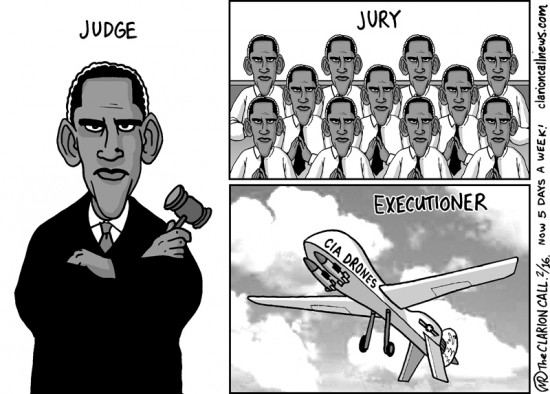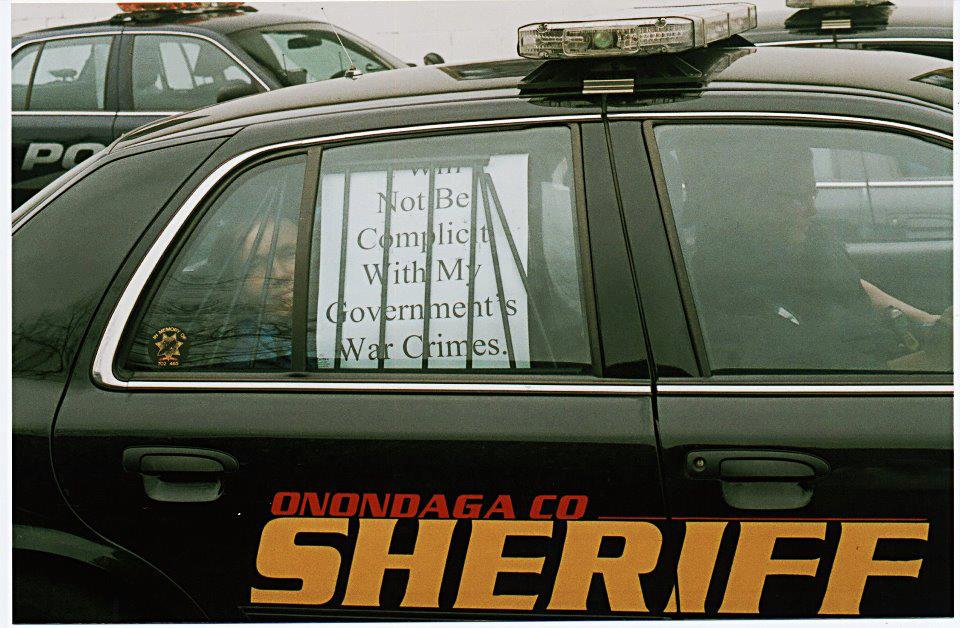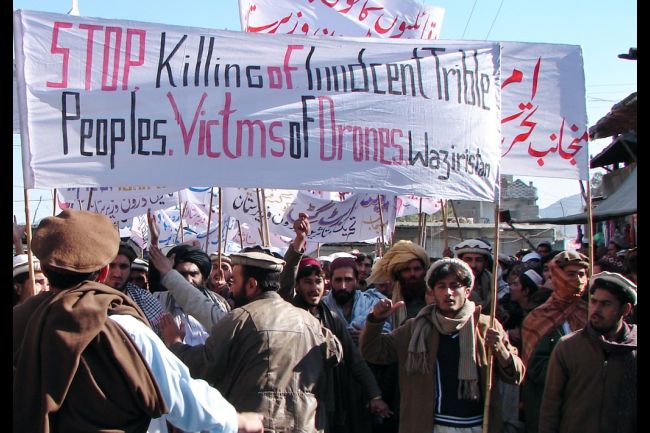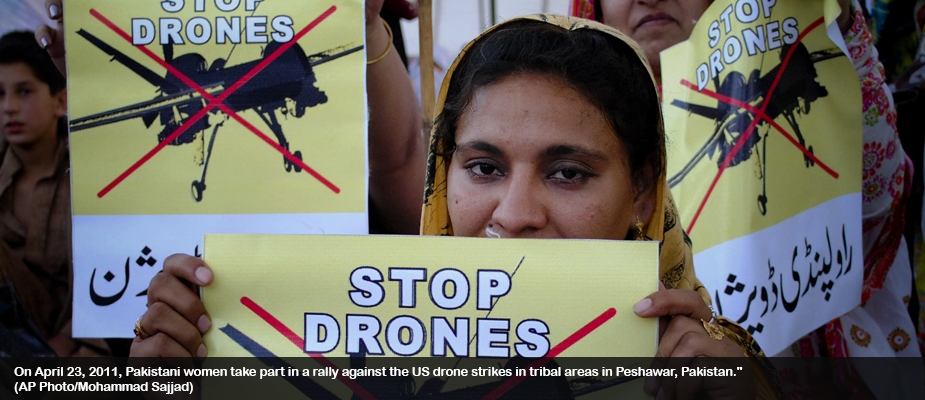After a several-hour-long trial on December 13, 2012, DeWitt Town Court judge Robert Jokl found eleven members of Upstate Drone Action guilty of “trespass,” a violation. The “trespass” occurred on June 28 outside the main entrance of Hancock Air Base, just north of Syracuse, as the defendants attempted to deliver a citizens’ indictment to the Base chain of command for the Reaper drone war crimes being committed from there. Here we present extracts (recalled from notes and memory) of several of the defendants’ court testimonies. The defendants all went pro se, defending themselves without being represented by an attorney. Since the trial, five defendants (Clare Grady, Ed Kinane, Ellen Grady, James Ricks, Rae Kramer) have each spent a week at Jameville Penitentiary. To learn more check www.upstatedroneaction.org.
Ed Kinane’s Testimony

Questioned by Rae Kramer
Ed (edkinane@verizon.net), from Syracuse, occasionally gives talks on why Upstate Drone Action opposes the Reaper drone and what UDA does about it.
Mr. Kinane, did you ever serve in the US military?
Not really. But I was in ROTC for about six weeks when I was at Fordham College back in the early sixties.
Six weeks? Why only six weeks?
Well, as you might know, Fordham is a Catholic college. One day we ROTC cadets had to do bayonet practice out on the parade ground. We didn’t actually have bayonets, but we were to simulate lunging. While doing so we had to chant, “KILL, KILL, KILL…” Now, doing that for an hour or two made me very uncomfortable. The very reason I chose Fordham was that it was a Jesuit college, i.e., a Christian college – where I had hoped for a rigorous intellectual and ethical grounding in the faith I grew up in. It struck me out there that day that chanting “KILL, KILL, KILL” over and over again didn’t quite square with Jesus’ teaching, at least as I understand that teaching. So, a day or two later I went to the ROTC commandant and resigned. To this day I’ve never been able to understand how Catholic colleges can possibly permit ROTC to operate on their campuses.
Can you tell me something about your work history?
Among other things I’ve been on the staff or on teams of several non-profit international organizations like Witness for Peace, Peace Brigades International and Voices in the Wilderness.

Do those organizations have anything in common?
Each is committed to nonviolence and they each focus on civilian human rights in war zones.
Tell us about your work with Peace Brigades.
Peace Brigades puts teams of volunteers into areas of civil strife. The volunteers provide protective accompaniment to local human rights activists who typically are threatened by death squads because of their work. The idea is that the presence of an international “unarmed bodyguard” can often deter the killings and abductions.
Where did you serve in Peace Brigades?
I served for six months each on the PBI teams in Guatemala, El Salvador and Sri Lanka. Also with PBI for two months in Haiti. All during their civil wars.
What other experience do you have in war zones?
In August 2011 I spent a month in Afghanistan with Voices for Creative Nonviolence. In 2003 I spent five months in Iraq with Voices in the Wilderness, traveling over much of the country. I was there for about five weeks before the US invasion and during the weeks of “Shock and Awe,” and for about three months during the US occupation.
So you were right in the midst of the bombing. What impact did that experience have on your understanding of aerial warfare and its effects on civilians?
I observed and I felt the terror that defenseless civilians on the ground feel when bombs are going off all around them. And I shared in some of the pain of having neighbors killed nearby. I came to believe that aerial warfare is terrorism and that therefore the greatest terrorist of all is the US Pentagon.
You’ve said you’re committed to nonviolence. Why, then, do you seem to gravitate to war zones?
Having been an anti-militarism activist since the seventies I’ve come to believe that, like warriors, activists need to be willing to take risks. It is especially appropriate for us to be in solidarity with the victims of US invasions. And I believe anti-militarism activists can be more effective and focused if we have a deeper understanding of what it is we oppose.
Clare Grady’s Testimony
Questioned by James Ricks
Clare is a mother of two and a long-time Ithaca Catholic Worker and anti-war activist.
What were you doing on the morning of June 28?
I went to Hancock Air Field, the national maintenance training center for the reaper drone, and a control center for US drones flying in Afghanistan.

after being arrested on April 22, 2012. Photo: unkown.
What did you do when you got there?
I stood at the entrance holding a sign that said “Drones = War Crimes.”
Do you understand the charge against you?
Yes, I am on trial now answering to the charge of trespassing. The violation trespass in NY State says that a person is guilty if they “knowingly and unlawfully” enter and remain upon the premises.
Do you think that you are guilty of this charge?
No, I knew that my actions were not illegal, that I was upholding the law.
How do you know that?
I heard Ramsey Clark, the former US Attorney General, testify in this very courtroom in November 2011, explaining that each of us as citizens has a right and responsibility to resist our government’s war crimes. My actions are taken to resist the war crimes being committed by my government with the drone work being done at Hancock Air Field.
Is there anything else that you would like to share?
Yes, I was just recently at a conference at Catholic University in Puerto Rico, where Loyola University law professor Frances Boyle said:
“Civil resistance is the last hope America has to prevent the US government from moving even farther down the path of lawless violence in Africa, the Middle East, Southwest Asia, military interventionism into Latin America, and nuclear confrontation with Iran, Pakistan, North Korea, Russia, and China.”
Boyle writes that in actions like these, “civil resistors disobeyed nothing, but to the contrary obeyed international law and the United States Constitution. By contrast, US government officials disobeyed fundamental principles of international law as well as US criminal law and thus committed international crimes and US domestic crimes as well as impeachable violations of the United States Constitution.”
Judy Homanich’s Testimony
Judy (safelyhome122204@aol.com), from Binghamton, was also arrested at Creech Airbase in Nevada while resisting drones.
My name is Judith A. Homanich. I’m the wife of George, one of my co-defendants, and the mother of Sarah and David, who is gone but not forgotten. David had a short and difficult but meaningful life. He was caring and compassionate with a strong sense of right and wrong. His first surgery was at three weeks of age and his 17th surgery, his cancer surgery, was at age 19. David’s death at age 21 on December 22, 2004 was due to cancer, not war, but I know the heart-wrenching, life-changing pain of losing a child, a precious loved one.
David’s cancer was diagnosed early in 2003 and we all knew from the beginning that his life expectancy was short. We had almost two years to love, laugh, appreciate life, and prepare for death. I can only imagine the unbearable grief of family members whose young child is out playing or collecting firewood one minute and murdered in a drone attack the next minute. These three young boys [on Judy’s T-shirt as she testified were pictures of the mutilated faces of three five-year olds], victims of drone attacks in Waziristan, Pakistan, were loved and cherished by people who mourn their loss and who are understandably angered by their murders. I know that their lives were just as precious and important and valuable as my son David’s. I know that they had a right to life, to hopes and dreams, to a future.
While speaking in India in October 2010, President Obama said, “Nothing ever justifies the slaughter of innocent civilians.” Yet the slaughter of innocent civilians like these young boys by extra-judicial killings continues. The US government calls these deaths “collateral damage” —I know these murders are war crimes. So as a mother who knows the pain of losing a child, I went to Hancock on June 28 to knowingly and lawfully act in solidarity with all mothers, daughters, wives and sisters around the world who suffer loss due to the illegal, immoral use of drones.
I was knowingly and lawfully at Hancock on June 28, 2012 because it’s my legal, moral and spiritual obligation to use my voice and my body to speak up and act out to uphold the rule of law, the US Constitution, human rights, and international law. I will continue to do so until President Barack Obama, Secretary of Defense Leon Panetta, Hancock Commander Col. Greg Semmel, every drone crew, every service member supporting or defending these illegal actions and you, Judge Jokl, act knowingly and lawfully to obey and uphold existing law.

James Ricks’ Testimony
Questioned by Dave McCallum
James, of Trumansburg, NY, is a long-time member of the Upstate NY Coalition to Ground the Drones and recently returned from a trip to Pakistan.
Why were you at Hancock Airbase on June 28?
To exercise my constitutional rights and duties as a responsible citizen.
Did you trespass?
No, I did not. I have a constitutional right to petition my government for the redress of grievances, and I had to deliver an indictment to the base for war crimes committed there.
Yes, but did you trespass?
No, I knew it was my duty as a responsible citizen to protest at Hancock, and how can a citizen’s duty be illegal?
Why do you say you knew it was your duty?
I was fortunate enough to hear former attorney general Ramsey Clark state in this very courtroom that it wasn’t just a right but a responsibility as a citizen to bring to the attention and call to a halt the war crimes committed at Hancock Airbase. It was my personal duty to stop it because I believe what is going on at the base is illegal.
Don’t you believe that the President of the United States and the United States Air Force know what is or is not legal?
I would hope so, but not in this instance. And it’s not the first time.
What do you mean?
Well, slavery and kidnapping were legal in this country not that long ago. I say kidnapping because I’m sure no one volunteered to be shackled, put in the bowels of the ship, and transported to a life of brutal domination.
Technically legal or not, slavery was always unjust and immoral. How can anything be unjust, immoral, and legal at the same time? I doubt that the concentration camps at Auschwitz and Dachau or any other death camp violated any local or national German law.
When it serves a powerful group, what is legal or not can become very slippery. Spin the story, redefine the crime, change the word, or all of the above. Premeditated murder is illegal, but collateral damage is not. Torture is illegal, but enhanced interrogation is not. Kidnapping to torture is illegal, but extraordinary rendition is not.
Leaders who speak with a forked tongue make laws for us to follow, or pay the penalty, laws that they obfuscate are redefined when they are accused of the same. Justice morphs into “Just Us,” it seems, when the view is from the top-down. Morality is ignored entirely. Under these conditions especially, what’s defined as legal, or not, should be examined very carefully. How can anything be unjust, immoral, and legal at the same time? But it happens, and it’s happening at Hancock Airbase right now.
Closing Statement
John Hamilton
John (yes2yay@yahoo.com) is a carpenter and activist from Ithaca.
First, a very important point to clarify. You, Judge Jokl, have heard several witnesses testify they engaged in “civil resistance.” This term has a specific meaning. It means taking actions that are legal, not illegal. We are upholding laws, not breaking them. Civil disobedience is trying to change laws. Civil resistance is upholding the law. We proudly claim our actions were civil resistance. Please understand this clearly.
We have heard testimony from several defendants that not only does current applicable law authorize their actions on June 28, but that current applicable law requires them to be there. They were acting from their constitutional responsibilities as citizens. And from their clear obligations under human law. We have shown beyond any doubt that we were acting legally. We have shown the laws are clear and binding and that they apply in this courtroom.
First let me speak to the operative laws themselves. As has been brought out, there are clear and binding laws that make every act of aggression by every nation a crime. These laws didn’t arise because some naive idealists got in a room and decided this would be a good idea.
These laws arose out of World War II, the closest we humans ever came to committing suicide. The lesson we humans learned was that we must somehow keep powerful nations from perpetrating acts of aggression, for our continued survival depends on this. All other questions of law in all countries of the world are subordinate to this need.

in tribal areas in Peshawar, Pakistan. AP Photo
All nations, our nation among them, publicly swore they would never, ever commit acts of aggression, for any reason and legally bound themselves to these laws through the UN Charter and the Geneva Conventions. They are still and always in effect, despite the illegal practices of any government.
In the Nuremburg trials, we humans began to formulate another layer of protection against acts of aggression. The Nuremburg tribunals declared that all citizens are legally obligated to assure their own government acts legally. In the trial of Nazi judges at Nuremburg, all judges were specifically required to uphold overarching human laws, even in domestic courts. These several overarching laws are known as customary human law. The first and most important is that acts of aggression are always illegal.
To be clear, all domestic internal questions of law, everywhere, are subordinate to customary human law, especially the prohibition on the use of force. We can easily see that this requirement is even more important for those of us who are citizens in strong nations. In weak nations, if the government breaks the law of aggression, the strong nations can force that government to follow the laws. When strong nations break the law of aggression, any attempt by other nations to enforce the law will result in a major war, which is what the laws are designed to avoid. Law-abiding citizens of strong nations, with support from their domestic judicial system, are the only means of enforcing these crucial laws without resorting to war.
These laws clearly bind you, but we recognize you question our legal analysis.
There have been other times in our history when important laws have been ignored by judges, which holds a useful parallel for the case at hand tonight. The 13th, 14th, and 15th amendments prohibit discrimination by race everywhere in the US. Yet, for decades, judges ignored these laws. The result was a shameful chapter in our history. Extra-judicial murder—lynching—went not only unpunished, but even worse, was ignored by the courts.
Tonight, Sergeant Moynihan testified he was bound only by NYS laws, not the US Constitution. This is exactly what happened in Alabama and other Southern states. The cops, prosecutors, and judges claimed they were acting lawfully under local and state law when they were acting in complete violation of the US Constitution. It follows that Sergeant Moynihan’s claims that his order to disperse is lawful under NYS law does not necessarily make it binding on US citizens, who have the full protections, rights, and responsibilities of the Constitution.
Today, we are in another shameful chapter of US history. The Reaper drone attacks engaged in and supported from Hancock are clearly illegal. We have factual and comprehensive documentation of both the laws and the crimes we are discussing, but we have not been asked or allowed to provide them. We offer still to provide our citizen’s indictments to the court.
Extra-judicial murder —human lynching—is occurring in your jurisdiction, judge. There are bodies hanging on the trees in East Molloy Road.
To continue the historical parallel, judges of the time in the South simply couldn’t conceive that these supreme laws actually applied in their courtroom. The ideology of white supremacy kept judges from recognizing their legal responsibilities under the law. Today, the ideology of US supremacy guides judicial activism, the tendency to ignore clear laws, in many courtrooms.
The ideology of American supremacy, that the US is somehow separate and above the law, does not release you from customary human law. Citing national security does not release you. There is no exception anywhere, for you, for me, for anyone from this overarching legal certainty: acts of aggression are always and everywhere illegal, and must not be ignored by the courts. Extra-judicial murder must be called out and stopped. Human lynching must end.
We ask that you take a bold step tonight to end international lynching, not in some backwood Alabama town in 1912, but here in your jurisdiction, in DeWitt in 2012. We ask you to find us not guilty of the charges.
It is the task of our generation to strengthen, not weaken, these overarching legal certainties upon which our common human future depends. We must act to strengthen, not weaken, human-wide agreements. We must do this here and now, as our contribution to a safer world, and for our children’s future.





